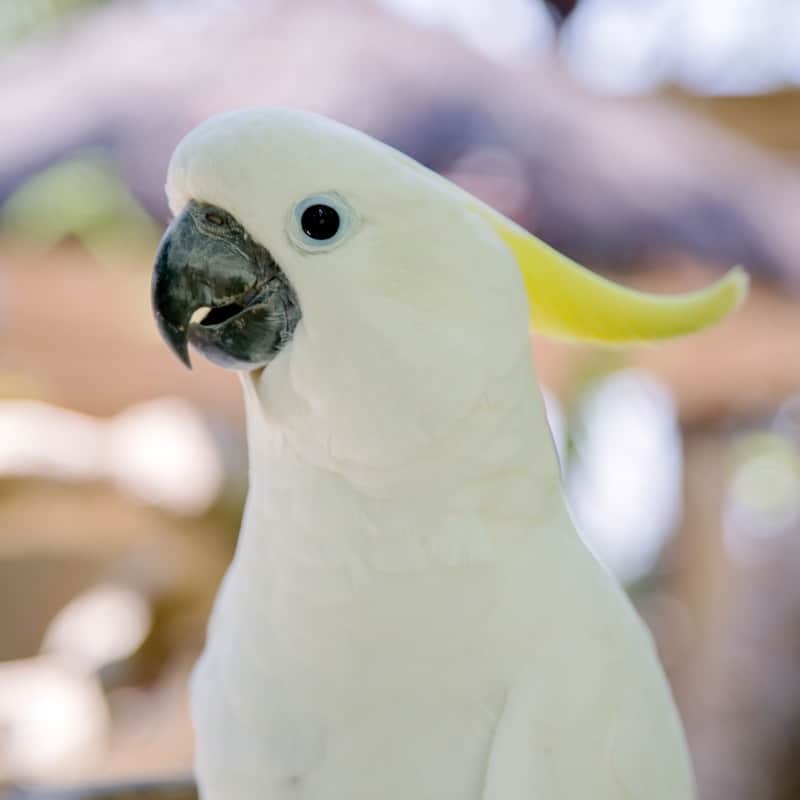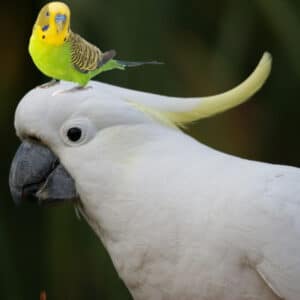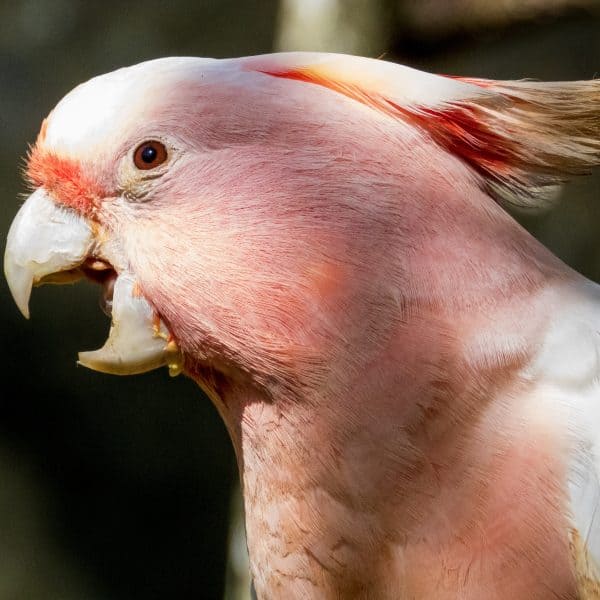Last Updated on by Mitch Rezman
Laurie C asks
My husband and I rescued a 3-month-old medium Sulphur-Crested Cockatoo (aka Eleonora cockatoo) from a horrible pet store situation last August.
We finished his hand-feeding which took another month.
He was very skinny and underfed so we have spoiled him rotten.
Eleanor, yes that’s his name even though he is male, can be quite loving and sometimes get too excited and bite a bit.
A few days ago we were offered the opportunity to purchase a 10-year-old Green-winged Macaw named Louis.
This bird has been rehomed once already going from a British couple to a young man who has had him for about 2 years.
Now the owner’s work became too involved and he can’t give Louis the time he feels he should have.
He gives Louis almost total freedom out on swinging perches and only puts him in a cage that really isn’t big enough when he has to cage him.
My husband wants to consider Louis but I am concerned.
What should we do?
We cannot give him the freedom he is used to, although we can provide a much larger cage.
We can get him out many times during the day to be handled and socialized.
Possibly we can get a large parrot tree for him to sit on sometimes with supervision.
How will Eleanor handle this?
Are we opening ourselves up for cockatoo problems?
Your advice greatly appreciated!
There is no way to predict the outcome of this Laurie
Do we know the sex of Loius (?)
We have an Australian bird and a South American bird.
I’ve seen it work.
I’ve seen it not work.
In your favor is that Eleanor is “young and dumb”.
She’d probably be happy to have a playmate.
Louis, on the other hand, is 10.
Male greenwings can be very “Alpha”.
Cockatoos can be “clingy”.
How Louis would react to a more restrictive lifestyle is anyone’s guess.
It’s important to note here cage size matters less than people give it credit for.
Birds actually like to be in their birdcage feeling safe.
If you make a cage inviting with lots of privacy you bird will thank you.
Macaws are long-tailed birds so you’ll want a dome top cage for interior height and something big enough so his tail doesn’t get banged at every turn.
You’ll want to discourage sitting atop the cage where he is higher than you which could trigger aggressive behavior.
From what we can gather, Keto, our recent African Ringneck rescue had as few as 4 and as many as 6 prior homes.
He’s a great (smart) bird.
He’s fun to be around and is a talker but he will bite given the opportunity.
We have learned to work around that but it took months, learning to socialize while not losing bits of flesh.
There is no magic pill.
Successful results of bird training have occurred since 1700 BC when falconry was (supposedly) born for the same reason.
Practice-rinse-repeat.
Your chances of success here increase exponentially with 2 well trained flighted birds.
Should you move forward, both parrots should be locked in their own cage for the first one-two-three weeks.
You can try to let one bird out at a time with the admonition that 2 wing flaps ending atop the other cage can cause the loss of a toe from a rapid bite if jealousies are in the air.
Louis should be introduced to clicker training as soon as he enters your home – 5 minutes a day.
Eleanor would enjoy the same facetime.
Best of luck on your new family.
Best
MitchR
Author Profile
Latest entries
 Feeding Exotic BirdsDecember 29, 2025How to Switch or Convert Your Bird From Seeds to Pellets: Real-Life Case Studies and Practical Guidance
Feeding Exotic BirdsDecember 29, 2025How to Switch or Convert Your Bird From Seeds to Pellets: Real-Life Case Studies and Practical Guidance Feeding Exotic BirdsDecember 16, 2025A Practical, Budget-Smart Guide to Feeding Birds Well
Feeding Exotic BirdsDecember 16, 2025A Practical, Budget-Smart Guide to Feeding Birds Well Bird EnviornmentsDecember 7, 2025Understanding Budgie Cage Bar Orientation: Myths, Realities & Practical Solutions for Vertical-Bar Bird Cages
Bird EnviornmentsDecember 7, 2025Understanding Budgie Cage Bar Orientation: Myths, Realities & Practical Solutions for Vertical-Bar Bird Cages Feeding Exotic BirdsDecember 5, 2025How Dr. T.J. Lafeber Rewrote the Future of Pet Bird Nutrition
Feeding Exotic BirdsDecember 5, 2025How Dr. T.J. Lafeber Rewrote the Future of Pet Bird Nutrition


